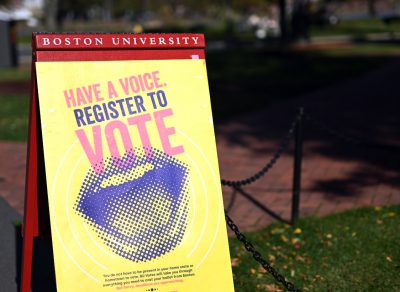Young voters are traditionally less likely to turn out on Election Day than any other age demographic, and the sharp increase in early and mail-in voting further complicated the process this year.

However, the voting rate among college students increased from 19 to 40 percent between 2014 and 2018, according to the National Study of Learning, Voting, and Engagement conducted by Tufts University, and those numbers were projected to rise this year.
Boston University President Robert Brown sent an email Oct. 16 to all BU students highlighting the importance of students exercising their voting rights.
Students who registered to vote outside of Massachusetts needed to request absentee ballots in their home state. College of Communication senior Rebecca Owen was among those who did so.
After submitting her absentee ballot application for Maryland over the summer, Owen said she received a confirmation letter informing her of where to send her ballot. She turned it in early October, and said the overall registration experience was fairly easy.
“I think registering to vote can seem quite intimidating, but the process is incredibly easy and there are so many great resources to ease that process,” Owen said. “I got my voter registration done at the DMV when I got my license.”
However, one confusing aspect of using absentee ballots, she said, was the number of checkboxes and information voters were required to fill out.
An expected 91 million Americans voted by mail this election — a figure much higher than those of previous elections — because of health and safety concerns surrounding in-person voting. Yet, thousands of absentee votes may have been discarded for several reasons, including late arrival to polling facilities, mismatched signatures and, in some states, failure to secure the ballot within a secrecy envelope.
With such data in mind, as well as the historically low turnout among 18–24 year olds, political groups on BU’s campus held meetings and events leading up to Tuesday to increase student engagement in politics.
CeCe Szkutak, president of BU College Democrats and a junior in the College of Arts and Sciences, said the organization had been supporting Democratic causes across the country that could be relevant to all members, rather than focusing solely on local politics.
“This semester in particular, one of our major goals was get-out-the-vote initiatives, seeing as it was an election year,” Szkutak said. “We think it’s extremely important for our members to not only go out and vote, but to also be informed about important elections that are happening around the country.”
In one such initiative, BUCD held a letter-writing session in late September with the nonpartisan organization Vote Forward, during which members wrote letters to registered voters in areas with low turnout rates about the importance of voting.
BUCD, along with BU College Republicans and both the CAS and university-wide Student Governments, collaborated on the bi-partisan “Vote with BU Spirit” initiative that promoted political education and engagement leading up to the 2020 election.
BU College Republicans did not respond to multiple requests for comment.
Szutak said students may have felt disillusioned or discouraged by the process, imagining their vote doesn’t count, but she believes that’s not the case.
“I think we see voter disenfranchisement at a lot of different levels,” Szkutak said. “But it’s really important for students to vote and realize how important their vote is, and how our generation really can make or break elections.”
In a September research study conducted by College Pulse — which gauges college students’ attitudes on a variety of topics — students overwhelmingly said they supported former Vice President Joe Biden in the election and revealed plans to vote by mail this year.
First-time voter Pia Hamel, a CAS freshman, said she believes voting in the presidential election was especially important, and it’s what primarily drove her to vote.
“We’ve had [Donald] Trump in office, and he is just horrific,” Hamel said. “I think it’s really important to use your voice however you can, and your vote is your voice.”
She said although the overall experience in requesting a ballot was straightforward, she had some difficulty locating which forms she needed to complete.
Some students, meanwhile, said they had been used to the process of mail-in voting.
Hessann Farooqi, a junior in CAS, said in his home state of Colorado, residents are sent a ballot regardless of whether they requested one or not. He said the universal mail-in policy makes voting amid the pandemic easier.
Voting, he added, is a way citizens can push the country toward the direction in which they wish to see change.
“It’s really one of the best ways,” Farooqi said, “that we all have of making a difference in our government.”























































































































